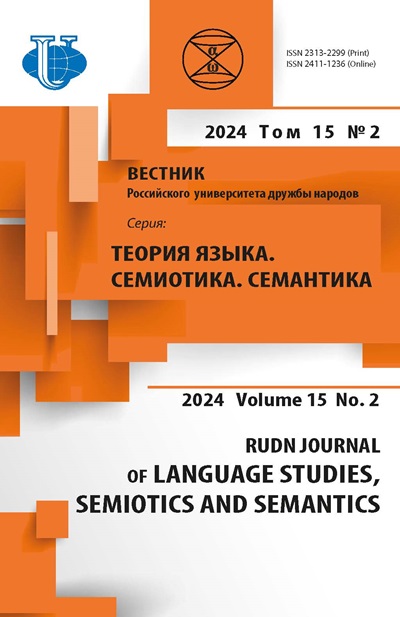Issue
Title
Authors
|
Chulkina N.L., Philippovich Y.N., Alexandrova O.I., Novospassskaya N.V., Rechinsky V.A. |
|
Yuhan -., Lazareva O.V., Barov S.A., Vered V.T. |
|
Zhikulina C.P., Perfilieva N.V., Li M. |
|
Zhang L., Kormazina O.P. |
|
Seliverstova E.I., Volkova L.B., Ma X. |
|
Kuzembayeva G.A., Maigeldiyeva Z.M., Maydangalieva Z.A. |
|
Nedopekina E.M., Cong H. |
|
Lian J., Lazareva O.V., Lazareva O.S. |
|
Novikov P.N. |
|
Sun Y., Rybakov M.A., Lysyakova M.V. |
|
Maksudov U.O., Khamidova N.S., Aminjonova R.H., Sharipova M.A. |
|
Chichina M.O. |
|
Paracchini L., Trofimova G.N. |
|
Novospasskaya N.V., Yang X., Mikhaylenko A.Y. |
|
Ding L., Lysyakova M.V. |
|
Larionova M.V., Demkina A.V. |
|
Dugalich N.M., Shavtikova A.T., Izildin O. |
|
Novospasskaya N.V., Raadraniriana A.M., Lazareva O.V. |
|
Тumanova A.B. |
|
Filyasova Y.A. |
|
Vavichkina T.A., Stepanyan K.N., Vlasova Y.E. |
|
Safaralieva L.A., Perfilieva N.V. |
|
Galankina I.I., Perfilieva N.V., Tsibizova O.V. |
|
Melnichuk O.A. |
|
Gurevich D.L. |
|
Monforte Dupret R.V., Chesnokova O.S. |
|
Al-Rahbi A.M., Zarytovskaya V.N. |
|
Suleimenova E.D., Akanova D.K., Aimagambetova M.M. |
|
Ouroumidou V.G. |
|
Antsa Miangola Malala Rahadraniriana -. |
|
Alhaded H.H., Glushchenko T.N., Alhadid H. |
|
Solopova O.A., Koshkarova N.N., Sibiriakov I.V. |
|
Paizbekova A.D. |
|
Strelchuk E.N., Lepkova A.S. |
|
Zholudeva L.I. |
|
Nedopekina E.M. |
|
Oganova E.A., Alekseeva O.A. |
|
Dugalich N.M. |
|
Perfilieva N.V., Da Silva F. |
|
Ivanova I.G., Egoshina R.A. |
|
Kurguzenkova Z.H., Krivoshlykova L.V. |
|
Kakzanova E.M. |
|
Dzhusupov M. |
|
Dugalich N.M. |
|
Ufimceva N.V. |
|
Moradi Mariam -. |
|
Li Chunrong -. |
|
Novikov A.L., Novikova I.A. |
|
Al-Foadi R.A., Zarytovskaya V.N., Al-Roznamachi R.H. |
|
Nagzibekova M.B., Khassanova S.R. |
|
Chinina D.S. |
|
Lutero T. |
|
Proshina Z.G. |
|
Nikolich M., Novospasskaya N.V. |
|
Perfilieva N.V., Galankina I.I. |
|
Moskvitcheva S.A., Li X. |
|
Li X. |
|
Medvedeva D.I., Fattakhova A.Z. |
|
Ali Madaeni Avval -., Maryam Moradi -. |
|
Mehrabi Qaysar -. |
|
Krivoshlykova L.V., Kurguzenkova Z.V. |
|
Alontseva N.V., Ermoshin Y.A. |
|
Fityan Reema -., Azcutia Maite -. |
|
Zarytovskaya V.N. |
|
Ikonnikova O.N., Kuzharova I.V. |
|
Hoseini A.A., Kahnamouei T.K. |
|
Bondareva V.V. |
|
Matytsina I.V. |
|
Perfilieva N.V., Hu P. |
|
Dugalich N.M. |
|
Ivanova M.V. |
|
Gerasimenko I.A., Kudria O.A. |
|
Perfilieva N.V. |
|
Oglezneva E.A., Pustovalov O.V. |
|
Alontseva N.V., Ermoshin Y.A. |
|
Dugalich N.M., Gishkaeva L.N. |
|
Hu Peipei -. |
|
Kudria O.A. |
|
Artyukhova N.S., Saykina O.S., Solovyeva A.A. |
|
Naumova E.A., Ananchenkova P.I. |
|
Ganapolskaya E.V. |
|
Tejerina G. |
|
Nelyubova N.Y. |
|
Kirov E.F. |
|
Ikonnikova O.N. |
|
Pudikova G.N. |
|
Galieva N.F. |
|
Vavichkina T.A. |
|
Bobrova E.D. |
|
Shevchenko O.A. |
|
Gribanov I.S. |
|
Egorov V.G. |
|
Kosogorova M.A. |
|
Gornostaeva A.A. |
|
Valentinova O.I., Rybakov M.A. |
|
Dildabekova A.K. |
|
Nauryzova A.K. |
|
Vavichkina T.A., Vlasova Y.E. |
|
Nikiforova S.A., Chesnokova O.S. |
|
Gamov A.N. |









